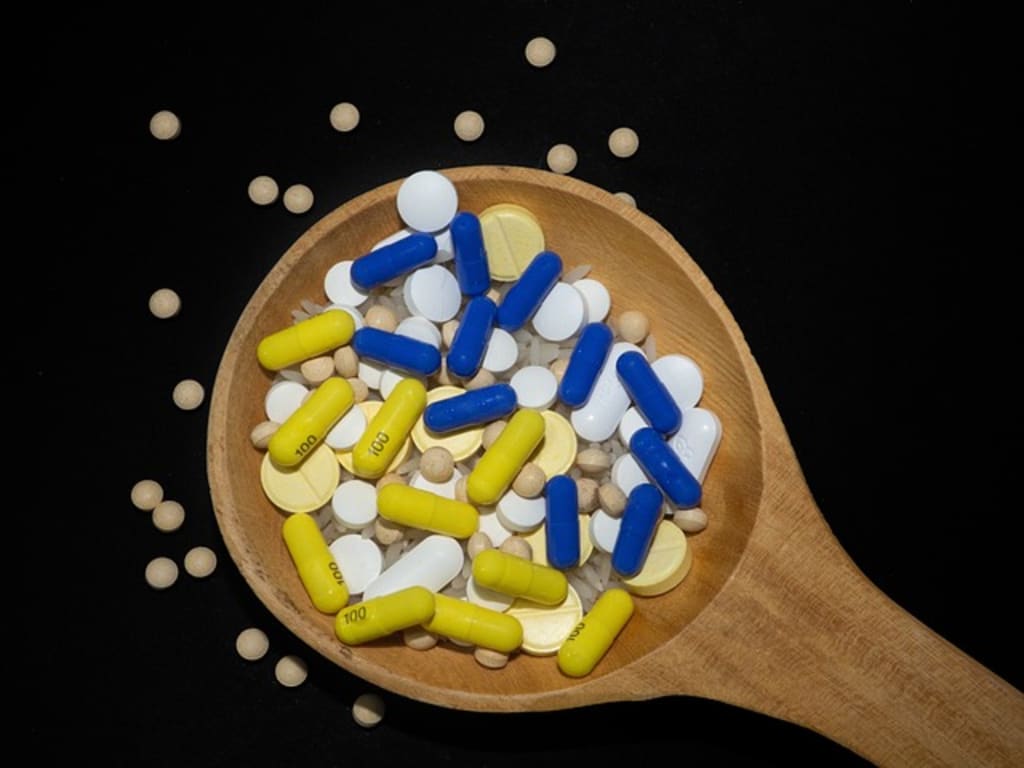Navigating Medication Interactions: Understanding How Your Diet Can Impact Your Treatment
Exploring the Influence of Food and Beverages on Medication Effectiveness and Safety

The world of medication is complex, and various factors can influence its effectiveness and potential interactions. It is crucial to be aware of these factors to ensure safe and optimal use of medications. This article explores some of the key things that can affect medications, including specific foods and substances. By understanding these interactions, individuals can make informed decisions and work closely with healthcare professionals to maximize the benefits of their medications while minimizing potential risks.
Grapefruit and Grapefruit Juice
Grapefruit and Grapefruit Juice can interact with various medications, including:
1. Statins: Grapefruit can increase the concentration of statin drugs in the bloodstream, potentially leading to an increased risk of side effects such as muscle pain and liver damage.
2. Calcium Channel Blockers: Grapefruit juice can interfere with the metabolism of certain calcium channel blockers, leading to higher drug levels in the body. This can result in a drop in blood pressure, dizziness, and an increased risk of side effects.
3. Immunosuppressants: Grapefruit juice can affect the metabolism of immunosuppressant medications like cyclosporine, leading to higher drug levels in the body and an increased risk of toxicity.
4. Antiarrhythmics: Certain antiarrhythmic drugs, such as amiodarone, can interact with grapefruit juice, potentially leading to an increased risk of side effects.
5. Antihistamines: Grapefruit juice can interfere with the metabolism of certain antihistamines, leading to higher drug levels and an increased risk of side effects such as drowsiness.
It's important to note that the specific medications affected by grapefruit or grapefruit juice can vary, and not all medications are impacted. It is advisable to check with a healthcare professional or pharmacist about potential interactions between specific medications and grapefruit products.
Dairy Products
Dairy products, particularly milk and certain cheeses, can affect the absorption and effectiveness of certain medications. Here are a few examples:
1. Antibiotics: Some antibiotics, such as tetracyclines (e.g., doxycycline) and fluoroquinolones (e.g., ciprofloxacin), can bind to calcium found in dairy products, forming complexes that are poorly absorbed. It is recommended to avoid consuming dairy products within a few hours of taking these antibiotics.
2. Thyroid Medications: Calcium-rich foods, including dairy products, can interfere with the absorption of synthetic thyroid hormones (e.g., levothyroxine). It is generally advised to take thyroid medications on an empty stomach, preferably in the morning, and wait for at least 30 minutes before consuming dairy products or calcium supplements.
3. Iron Supplements: Calcium from dairy products can inhibit the absorption of iron, particularly non-heme iron (found in plant-based foods and supplements). If you are taking iron supplements, it is recommended to avoid consuming dairy products or calcium-rich foods around the same time.
4. Antacids: Some antacids contain calcium, and consuming dairy products along with these antacids can result in an excessive intake of calcium. This may interfere with the absorption of certain medications or lead to imbalances in calcium levels in the body. It is important to follow the instructions provided by the healthcare professional or pharmacist regarding the timing and consumption of antacids and dairy products.
Always consult with your healthcare provider or pharmacist for specific instructions regarding the interaction between dairy products and your medications, as individual circumstances may vary.
High-Fiber Foods
High-fiber foods, while generally beneficial for health, can interact with certain medications. Here are some considerations:
1. Oral Medications: High-fiber foods, especially those rich in soluble fiber, can slow down the absorption of certain medications from the digestive tract. This can affect the medication's effectiveness or lead to delayed onset of action. It is generally recommended to take medications either one hour before or two hours after consuming high-fiber foods to minimize potential interactions.
2. Diabetes Medications: Some medications used to manage diabetes, such as metformin, work by reducing glucose absorption in the intestines. Consuming high-fiber foods alongside these medications can potentially interfere with their effectiveness. It is important to follow the instructions provided by the healthcare professional regarding the timing of medication intake and dietary fiber consumption.
3. Warfarin (Anticoagulant): High-fiber foods, particularly those high in vitamin K (such as leafy greens), can affect the anticoagulant effects of warfarin. Vitamin K plays a role in blood clotting, and consuming varying amounts of vitamin K-rich foods can impact the stability of the anticoagulation therapy. Consistency in vitamin K intake is generally recommended, and individuals taking warfarin should consult with their healthcare provider for personalized dietary guidelines.
4. Water-Soluble Medications: High-fiber foods can increase bowel movements and potentially reduce the time medications spend in the digestive system. This can affect the absorption of water-soluble medications that rely on adequate contact time in the intestines. It is advisable to separate the intake of high-fiber foods from water-soluble medications by at least a couple of hours.
As always, it is important to discuss any concerns or questions about interactions between high-fiber foods and medications with your healthcare provider or pharmacist. They can provide specific recommendations based on your individual medication regimen and dietary needs.
Vitamin K-Rich Foods
Vitamin K-rich foods can have an impact on medications, particularly those that affect blood clotting. Here's what you need to know:
1. Warfarin (Anticoagulant): Warfarin is a commonly prescribed anticoagulant medication that works by inhibiting vitamin K-dependent clotting factors. Consistently consuming varying amounts of vitamin K-rich foods can interfere with the stability of the anticoagulation therapy. It is important for individuals taking warfarin to maintain a consistent intake of vitamin K and consult with their healthcare provider for personalized dietary guidelines.
2. Other Anticoagulants: While not as sensitive to vitamin K-rich foods as warfarin, other anticoagulant medications like direct oral anticoagulants (DOACs) can still interact with vitamin K. However, the impact is generally less significant compared to warfarin. It is still advisable to maintain a balanced intake of vitamin K-rich foods and inform your healthcare provider about your diet.
3. Vitamin K Supplements: If you are taking vitamin K supplements or multivitamins containing vitamin K, it's important to inform your healthcare provider. This is because high doses of vitamin K from supplements can interfere with the effectiveness of anticoagulant medications.
4. Consistent Intake: While it's important to be aware of vitamin K-rich foods, it's worth noting that a consistent intake of vitamin K is generally recommended rather than completely avoiding these foods. The goal is to maintain a balance between medication effectiveness and overall nutritional needs.
It's crucial to work closely with your healthcare provider or pharmacist to establish a personalized plan that incorporates your medication regimen, dietary preferences, and any necessary adjustments to vitamin K intake. They can provide specific guidance based on your individual circumstances.
Tyramine-Rich Foods (e.g., aged cheese, cured meats)
Tyramine-rich foods, such as aged cheese and cured meats, can interact with certain medications, particularly monoamine oxidase inhibitors (MAOIs). Here's what you need to know:
1. Monoamine Oxidase Inhibitors (MAOIs): MAOIs are a type of antidepressant medication that works by inhibiting the enzyme monoamine oxidase. Tyramine, a naturally occurring compound found in certain foods, is normally broken down by this enzyme. When MAOIs are taken, they can inhibit the breakdown of tyramine, leading to a buildup of tyramine in the body. This can cause a sudden increase in blood pressure, potentially leading to a severe reaction known as a hypertensive crisis.
2. Tyramine-Rich Foods: Tyramine is found in various foods, but the highest concentrations are typically found in aged, fermented, or preserved foods. Some examples of tyramine-rich foods include aged cheese (such as blue cheese, cheddar, and feta), cured meats (such as salami, pepperoni, and smoked meats), fermented foods (such as sauerkraut and kimchi), pickled or marinated foods, and certain alcoholic beverages (such as red wine and beer).
3. Dietary Restrictions: When taking MAOIs, healthcare providers often advise individuals to follow a low-tyramine diet to minimize the risk of a hypertensive crisis. This typically involves avoiding or limiting consumption of tyramine-rich foods and beverages. It's important to follow the specific dietary recommendations provided by the healthcare provider or pharmacist while taking MAOIs.
4. Interactions with Other Medications: While tyramine-rich foods are most commonly associated with MAOIs, some other medications, such as linezolid (an antibiotic), can also interact with tyramine-rich foods. In these cases, a similar dietary restriction may be advised to prevent potential interactions.
If you are taking MAOIs or any other medication that may interact with tyramine-rich foods, it is essential to consult with your healthcare provider or pharmacist for specific dietary guidelines. They can provide personalized recommendations to ensure your medication's effectiveness and minimize potential risks.
Alcohol and Alcoholic Beverages
Alcohol and alcoholic beverages can interact with various medications and have potential effects on their effectiveness and side effects. Here are some important points to consider:
1. Central Nervous System Depressants: Alcohol is a central nervous system depressant, and combining it with other medications that have similar effects can lead to increased sedation, drowsiness, and impaired motor skills. Medications such as benzodiazepines, opioids, sleep aids, and certain antidepressants can intensify these effects when taken with alcohol.
2. Interference with Medication Metabolism: Alcohol can interfere with the metabolism of certain medications in the liver, potentially affecting their breakdown and clearance from the body. This can lead to increased drug levels in the bloodstream, which may result in intensified side effects or reduced effectiveness. Specific medications that may be affected by alcohol include anticoagulants, antidepressants, anticonvulsants, and some antibiotics.
3. Gastrointestinal Effects: Alcohol can irritate the gastrointestinal tract, leading to increased stomach acid production and potential damage to the lining of the stomach and intestines. This can be particularly problematic when combined with medications that also have gastrointestinal side effects, such as nonsteroidal anti-inflammatory drugs (NSAIDs) or corticosteroids.
4. Worsening of Medical Conditions: Alcohol can worsen certain medical conditions, such as liver disease, pancreatitis, gastrointestinal ulcers, and mental health disorders. Combining alcohol with medications used to manage these conditions can undermine treatment outcomes and increase the risk of complications.
5. Specific Medication Interactions: Some medications have specific interactions with alcohol. For example, drinking alcohol while taking acetaminophen (paracetamol) can increase the risk of liver damage. Mixing alcohol with certain antibiotics, such as metronidazole or sulfamethoxazole/trimethoprim, can cause severe reactions including nausea, vomiting, flushing, and rapid heartbeat.
It is important to consult with your healthcare provider or pharmacist about the specific interactions between alcohol and any medications you are taking. They can provide guidance on whether alcohol consumption should be avoided entirely or if moderate consumption may be acceptable in your individual case. It is always best to err on the side of caution and prioritize your health and safety when considering alcohol use alongside medications.
Caffeine
Caffeine, a stimulant found in various beverages and foods, can interact with medications and have potential effects on their efficacy and side effects. Here are some key points to consider:
1. Central Nervous System Stimulants: Caffeine acts as a central nervous system stimulant, similar to certain medications such as ADHD stimulant medications or certain antidepressants. Combining caffeine with these medications can increase the stimulant effects, potentially leading to increased nervousness, restlessness, and an elevated heart rate.
2. Diuretic Effects: Caffeine has diuretic properties, meaning it can increase urine production and promote fluid loss from the body. This effect can potentially interact with certain medications that have diuretic effects or impact fluid balance, such as some blood pressure medications or lithium (used to treat bipolar disorder). It is important to monitor fluid intake and consult with your healthcare provider if you have concerns about potential interactions.
3. Interference with Medication Absorption: Caffeine can affect the absorption of some medications from the digestive tract. It may speed up or slow down the absorption, potentially altering their effectiveness. This is more likely to occur with medications that rely on specific absorption rates or mechanisms. It is advisable to follow the recommended guidelines provided with your medication or consult with your healthcare provider or pharmacist for specific instructions regarding caffeine consumption and medication timing.
4. Side Effects Amplification: Caffeine can enhance certain side effects associated with medications, such as increased gastrointestinal distress, nervousness, or insomnia. If you are experiencing side effects from your medications, it may be worth considering reducing or moderating your caffeine intake to see if it helps alleviate the symptoms.
5. Individual Sensitivity: Each person may have a different level of sensitivity to caffeine, and the interactions with medications can vary based on individual factors. It's essential to be mindful of your body's response to caffeine and any potential interactions with your medications.
If you have concerns about caffeine interactions with specific medications, it is recommended to consult with your healthcare provider or pharmacist. They can provide personalized advice based on your medication regimen and individual circumstances.
Salt and Sodium-Rich Foods
Salt and sodium-rich foods can have an impact on certain medical conditions and medications. Here are some important points to consider:
1. High Blood Pressure: Excessive salt intake can contribute to high blood pressure (hypertension). For individuals with hypertension, reducing sodium intake is often recommended as part of a comprehensive treatment plan that may include lifestyle changes and medication. Consuming a diet low in sodium, which includes minimizing the intake of processed and packaged foods high in sodium, can help manage blood pressure levels.
2. Diuretic Medications: Some medications, such as diuretics (water pills), are commonly prescribed to help lower blood pressure or treat certain medical conditions. Diuretics work by increasing urine production and promoting the excretion of sodium and water from the body. When taking diuretics, it is important to be mindful of salt intake because excessive sodium consumption can counteract the effects of these medications.
3. Fluid Retention: Some medical conditions, such as heart failure or kidney disease, can lead to fluid retention. In these cases, reducing sodium intake is often advised to help manage the fluid balance in the body. Medications used to treat these conditions may also be prescribed to help reduce fluid retention, and sodium restriction can support their effectiveness.
4. Electrolyte Imbalance: Sodium is an essential electrolyte that helps regulate fluid balance, nerve function, and muscle contractions. Certain medications, such as diuretics or certain antidepressants, can impact electrolyte levels, including sodium. It is important to follow the guidelines provided by your healthcare provider regarding sodium intake and any necessary monitoring of electrolyte levels while taking these medications.
5. Other Medical Conditions: Sodium intake may need to be monitored in individuals with conditions such as kidney disease, heart disease, or certain liver conditions. These conditions can affect fluid balance, blood pressure, and electrolyte levels, making sodium intake a consideration in managing the overall treatment plan.
It is crucial to work closely with your healthcare provider or a registered dietitian to establish an appropriate dietary plan that aligns with your medical conditions, medications, and overall health goals. They can provide personalized guidance on sodium intake and help you make informed decisions about your diet.
Licorice
Licorice, specifically black licorice, contains a compound called glycyrrhizin, which can interact with certain medications and have potential effects on health. Here are some important points to consider:
1. Blood Pressure and Potassium Levels: Glycyrrhizin in licorice can cause an increase in blood pressure and a decrease in potassium levels. This effect is more likely to occur with regular and high consumption of licorice or licorice supplements. Individuals with high blood pressure, heart disease, or those taking medications that affect blood pressure or potassium levels should exercise caution and limit licorice consumption.
2. Diuretic Medications: Licorice can have a diuretic effect, meaning it can increase urine production and promote fluid loss from the body. When combined with diuretic medications, this can potentially enhance their effects and lead to increased fluid loss, electrolyte imbalances, and dehydration. If you are taking diuretic medications, it is important to consult with your healthcare provider about potential interactions and adjust your licorice consumption accordingly.
3. Medications Metabolized by the Liver: Glycyrrhizin in licorice can interfere with the metabolism of certain medications in the liver, potentially affecting their breakdown and clearance from the body. This can lead to increased drug levels in the bloodstream, which may result in intensified side effects or reduced effectiveness. It is advisable to consult with your healthcare provider or pharmacist if you are taking medications that may be affected by liver metabolism.
4. Hormone Interactions: Licorice may have estrogen-like effects and can interfere with hormonal medications or therapies. It is important to inform your healthcare provider about any licorice consumption if you are undergoing hormone therapy or taking medications that interact with estrogen levels.
5. Pre-existing Medical Conditions: Individuals with certain medical conditions, such as kidney disease, liver disease, heart disease, or a history of high blood pressure, should be cautious with licorice consumption. Licorice can potentially worsen these conditions or interact with medications used to manage them.
It is recommended to discuss licorice consumption and any concerns about interactions with medications or medical conditions with your healthcare provider. They can provide personalized guidance based on your specific situation and help you make informed decisions about your dietary choices.
Spicy Foods (may interact with certain gastrointestinal medications)
Spicy foods can potentially interact with certain gastrointestinal medications and have effects on digestive health. Here are some important points to consider:
1. Gastroesophageal Reflux Disease (GERD): Spicy foods can trigger or worsen symptoms of GERD, a condition characterized by acid reflux and heartburn. These foods can relax the lower esophageal sphincter, allowing stomach acid to flow back into the esophagus. If you are taking medications to manage GERD, such as proton pump inhibitors (PPIs) or H2 blockers, it is advisable to avoid or limit consumption of spicy foods to help control symptoms.
2. Gastric Ulcers: Spicy foods can irritate the stomach lining and potentially exacerbate symptoms in individuals with gastric ulcers. Medications prescribed to treat ulcers, such as proton pump inhibitors or antibiotics, aim to reduce stomach acid production and promote healing. Minimizing the intake of spicy foods can support the effectiveness of these medications and aid in ulcer management.
3. Irritable Bowel Syndrome (IBS): Spicy foods can be a trigger for symptoms in individuals with IBS, a chronic gastrointestinal disorder. The capsaicin in spicy foods can stimulate the gut, leading to abdominal pain, bloating, and changes in bowel habits. If you are taking medications to manage IBS symptoms, it may be beneficial to avoid or reduce consumption of spicy foods to help maintain symptom control.
4. Medications with Gastrointestinal Side Effects: Some medications used to treat gastrointestinal conditions, such as nonsteroidal anti-inflammatory drugs (NSAIDs) or certain antibiotics, can cause gastrointestinal side effects like stomach irritation or ulcers. Spicy foods can further irritate the stomach lining and potentially worsen these side effects. It may be advisable to avoid or limit spicy foods while taking these medications.
5. Individual Tolerance: It's important to consider your personal tolerance for spicy foods. Some individuals may be more sensitive to the effects of spicy foods on the digestive system, while others may have a higher tolerance. Pay attention to how your body reacts to spicy foods and make adjustments accordingly.
If you have concerns about the interaction between spicy foods and your gastrointestinal medications or conditions, it is recommended to consult with your healthcare provider or a registered dietitian. They can provide personalized guidance and help you make dietary choices that align with your specific needs and treatment plan.
When it comes to medication, it is essential to consider the various factors that can influence its effectiveness. This article has highlighted some of the key things that can affect medications, including specific foods and substances. From grapefruit juice and dairy products to high-fiber foods and vitamin K-rich foods, being mindful of these interactions can help individuals make informed choices and promote safe and effective medication use. It is always recommended to consult with healthcare providers or pharmacists for personalized advice regarding medication interactions and dietary considerations. By staying informed and actively participating in your healthcare, you can ensure that medications work optimally to support your well-being.
About the Creator
LOZY WORLD
I am an accomplished writer and promoter of a balanced lifestyle through mindful eating. With a deep-seated interest in the relationship between food and well-being, I try to make the connection between healthy eating habits and health.






Comments
There are no comments for this story
Be the first to respond and start the conversation.